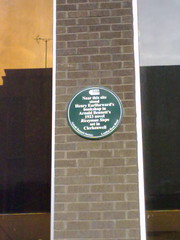Arnold Bennett
Commemorated on 6 plaques
Arnold Bennett 1867-1931 novelist lived here
75 Cadogan Square, London, United Kingdom where they lived
Arnold Bennett author 1867-1931 lived, worked and died here 1930-1931
Chiltern Court, Baker Street, London, United Kingdom where they lived , worked , and died (1931)
L'auteur anglais Arnold Bennett (1867-1931) vécut dans la villa "Les Néfliers" (1908-1911) où il écrivit son chef d'oeuvre "The Old Wives' Tale"
English translation: English author Arnold Bennett (1867-1931) lived in the villa “Les Néfliers” (1908-1911) where he wrote his masterpiece “The Old Wives' Tale” [AWS Translate]
Villa "Les Nefliers", Avon, Seine-et-Marne, Île-de-France, France, Avon, France where they lived
Near this site stood Henry Earlforward's bookshop in Arnold Bennett's 1923 novel Riceyman Steps set in Clerkenwell
Travel Lodge Farringdon, 10-42 King's Cross Road, London, United Kingdom where they lived
The Chelsea Works 1888 Moorland Pottery. Setting for the 1914 novel The Price of Love by Arnold Bennett (1867-1931)
Moorland Pottery, Moorland Road, Stoke-on-Trent, United Kingdom where they wrote about (1914)
Arnold Bennett (1867-1931) Author & Journalist Studied Here
Orme Road, Newcastle-under-Lyme, United Kingdom where they was







